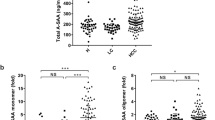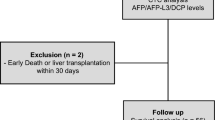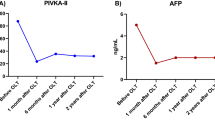Abstract
The only hope for effective treatment of hepatocellular carcinoma (HCC or 'hepatoma') lies in early diagnosis. Measurement of the serum alphafetoprotein (AFP) level is potentially a useful screening test. When grossly raised, it is almost diagnostic of HCC. However, modestly elevated levels may also arise in patients with benign chronic liver disease, and this markedly decreases the test's specificity and hence its clinical value. In 582 consecutive attendees at an outpatient clinic for people with chronic liver disease, a single blood sample was taken for analysis of 'total' AFP and the 'hepatoma-specific' AFP isoform. Using ultrasonography as the primary screening method, patients with AFP levels > or = 50 ng ml-1 were followed up throughout the study or until HCC was diagnosed on the basis of conventionally defined criteria. On entry into the study, 53 patients had an AFP concentration > = or 50 ng ml-1 and the 'hepatoma-specific' AFP isoform was detected in 26 of these. During an 18-month follow-up period, a diagnosis of HCC was established by conventional methods in 19 (17 'definite' and two 'probable') of these 26 patients. In only two cases was there ultrasound evidence of tumour development at the time AFP was first found to be elevated; in the remainder a diagnosis of HCC, based on ultrasound screening, was established at a median time of 3.6 months (range 1-18 months) after entry into the study. Among those 27 without the 'hepatoma-specific' isoform, one developed a 'definite' HCC and two developed 'probable' tumours. With the application of 'hepatoma-specific' AFP, the positive predictive value of the test was 73.1%, compared with only 41.5% using the conventional 'total' AFP test. Application of this test for the 'hepatoma-specific' AFP markedly increases the positive predictive value of AFP and, in some cases, permits the presence of tumour to be inferred before it could be detected by routine ultrasound examination.
This is a preview of subscription content, access via your institution
Access options
Subscribe to this journal
Receive 24 print issues and online access
$259.00 per year
only $10.79 per issue
Buy this article
- Purchase on Springer Link
- Instant access to full article PDF
Prices may be subject to local taxes which are calculated during checkout
Similar content being viewed by others
Author information
Authors and Affiliations
Rights and permissions
About this article
Cite this article
Johnson, P., Leung, N., Cheng, P. et al. 'Hepatoma-specific' alphafetoprotein may permit preclinical diagnosis of malignant change in patients with chronic liver disease. Br J Cancer 75, 236–240 (1997). https://doi.org/10.1038/bjc.1997.39
Issue Date:
DOI: https://doi.org/10.1038/bjc.1997.39



